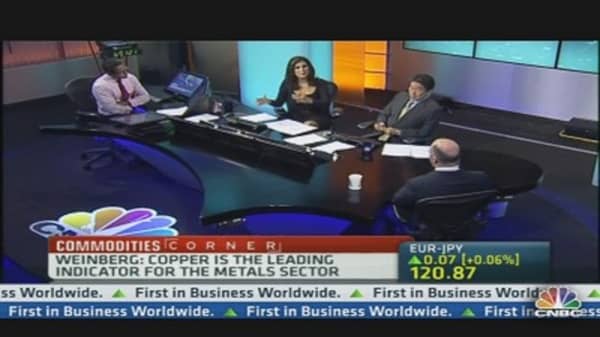The slowdown in the world's largest economies last year, particularly in China, led to warnings that the end of the commodities super-cycle was near, as prices of key resources plummeted.
However, a flood of government stimulus unveiled in recent months has reversed that trend, prompting one expert to say the commodities bull run that began in 2002 is here to stay.
"(The super cycle) is still intact. The combination of the economic recovery, especially with China powering ahead, and continuing support from central banks…It's going to be a good year for commodities," Eugen Weinberg, global head of commodities research at Commerzbank told CNBC on Friday, pointing to the Bank of Japan's commitment to open-ended easing this week.
(Read More: BOJ Pledges to BuyAssets; ' Yes' to 2% Inflation Target )
The commodities market was mired by volatility in 2012, as concerns around the euro zone debt crisis and the U.S. "fiscal cliff" mixed with major stimulus announcements out of the European Central Bank and Federal Reserve in the second half of the year led to large swings in prices.
In June, for example, commodities took a large hit on concerns over the global economic outlook, with the Standard & Poor's GSCI (Goldman Sachs Commodity Index), which tracks 24 commodities, falling to its lowest levels in two years.
But this year, Weinberg said he expects commodity prices to rise "markedly."
"The year 2013 has not only started off on a positive note on the commodities markets, we also firmly believe that this trend will continue over the course of the year," he said.
Commodities including copper, which is seen as a leading indicator for the metals sector, and oil have been on a steady uptrend, rising 3.6 percent and 11.7 percent, respectively, over the past three months.
Top Picks
Within the three broad commodity classes: energy, base metals and precious metals, Weinberg is most upbeat on the U.S. West Texas Intermediate (WTI) crude, copper and platinum.
He expects WTI prices to narrow their gap with Brent crude, forecasting a spread of just $5 a barrel by the end of the year from the current $17. In addition to increased demand, U.S. crude prices will likely be supported by the expansion of a key oil pipeline in the country, helping to drain excess capacity from the Midwest region.
Within the base metals, Weinberg is bullish on copper. He says while there may be oversupply in the short run, we could see a deficit over the medium to long term. A lack of new copper mining projects being developed could be a reason.
He forecasts copper prices will rise over 8 percent in 2013 to end the year at $8,800 a ton. Three-month copper on the London Metal Exchange traded at $8,092.50 on Thursday.
Finally, in the precious metals space, he prefers platinum, which he believes could touch $2,000 per ounce this year, from the current $1,667 level.
His bullish outlook for platinum is driven by potential supply constraints for the metal, which is used in the production of catalytic converters for automobiles.
"South Africa, which produces 75 percent of the world's mined platinum, is having huge troubles with rising costs, putting pressure on margins of producers. Many mines are unprofitable which could lead to further mine closures," he said.





